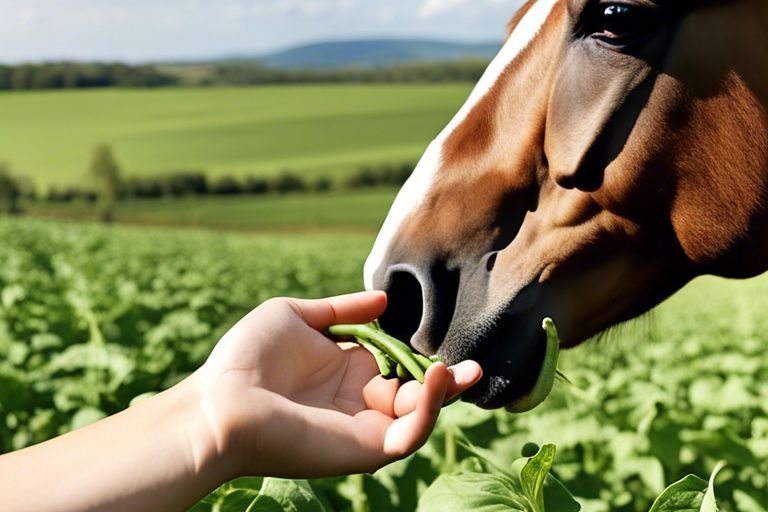Just like SUVs dominate the American automotive landscape, green beans have become a popular treat for horses. Horse owners often wonder if feeding their equine companions this vegetable is a wise choice or a potential risk. In this informative blog post, we will probe into the benefits and potential drawbacks of feeding green beans to horses, providing you with the knowledge you need to make an informed decision for your four-legged friend.
Nutritional Profile of Green Beans
Vitamins and Minerals
For horses, green beans can be a valuable addition to their diet due to their rich vitamin and mineral content. Green beans are a good source of vitamins A, C, and K, as well as important minerals such as iron, calcium, and magnesium. These nutrients play a crucial role in supporting overall health and well-being in horses.
Carbohydrates and Fiber
Minerals are another important component of green beans that can benefit horses. Green beans are particularly high in potassium, which is important for maintaining proper muscle function and electrolyte balance in equines. Additionally, they contain moderate levels of phosphorus and trace amounts of other minerals like zinc and copper, which are vital for various metabolic functions in horses.
Green beans are not only low in carbohydrates, making them a suitable option for horses that require a controlled sugar intake, but they are also high in fiber. Fiber is important for promoting healthy digestion and maintaining a stable gut environment in horses, making green beans a nutritious and beneficial treat for your equine companion.
Benefits of Feeding Green Beans to Horses
You may be wondering about the benefits of incorporating green beans into your horse’s diet. Green beans offer a range of advantages, from contributing to digestive health to aiding in weight management. While green beans should be fed in moderation, they can be a great addition to your horse’s treat repertoire.
Digestive Health
Beans: Green beans are rich in fiber, which can aid in digestion for horses. By adding green beans to your horse’s diet, you can help promote a healthy gut and prevent issues such as colic and other digestive disorders. For more information on treats that benefit digestion, check out A Variety of Treats to Try.
Weight Management and Diabetes
On: Green beans are low in calories and sugar, making them a suitable snack for horses that need to watch their weight or are at risk of diabetes. By replacing high-calorie treats with green beans, you can help your horse maintain a healthy weight and reduce the risk of metabolic conditions. For more details on how diet can impact weight management, especially in horses with diabetes, continue reading.
It: is important to consult with your veterinarian or equine nutritionist before making any significant changes to your horse’s diet. While green beans can offer benefits, they should be introduced gradually and in moderation to prevent any digestive upset or nutritional imbalances.
Potential Risks and Considerations
Choking Hazard
Some horse owners may not realize that whole green beans can pose a choking hazard to horses, especially if the beans are fed in large quantities or to horses who tend to eat too quickly. Ingesting beans without proper chewing can block the horse’s airway and lead to a serious medical emergency.
Allergic Reactions and Toxicity
On rare occasions, horses can have allergic reactions to green beans, although this is not common. To minimize the risk of allergic reactions or potential toxicity, it is advisable to introduce green beans to your horse’s diet slowly and in small quantities. Monitor your horse for any signs of adverse reactions, such as hives, swelling, or difficulty breathing.
With their high protein and fiber content, green beans can be a nutritious addition to a horse’s diet when fed in moderation. However, it is important to be aware of the potential risks and considerations involved in feeding green beans to horses to ensure your horse’s safety and well-being.
Feeding Guidelines for Horses
Appropriate Portions and Frequency
Despite the fact that green beans are a nutritious treat for horses, it is important to feed them in appropriate portions and frequency. Excessive consumption can lead to digestive discomfort and potentially harmful effects on horse health. To avoid any issues, it is recommended to introduce green beans slowly into your horse’s diet and monitor their response closely.
Preparation and Serving Suggestions
With green beans being a great source of vitamins and minerals for horses, it’s vital to prepare and serve them properly. Consider chopping the green beans into smaller pieces to prevent choking hazards, and always wash them thoroughly to remove any pesticides or dirt. Additionally, mixing green beans with your horse’s regular feed can make it more palatable for picky eaters.
Frequency of serving green beans to horses can vary depending on their individual dietary needs and preferences. It is generally recommended to offer green beans as an occasional treat rather than a daily component of their diet. This ensures that your horse receives a balanced nutritional intake without overloading on one specific type of food.
Conclusion
To wrap up, green beans can be a healthy treat for horses when given in moderation. They are a good source of vitamins, minerals, and fiber that can benefit a horse’s diet. However, excessive consumption of green beans can pose a risk to horses, especially if they are not accustomed to this particular type of food. It is important to introduce new treats gradually and with caution to avoid any digestive issues or potential choking hazards. As with any treat, it is vital to consider the individual needs and preferences of each horse to ensure their well-being and health.
